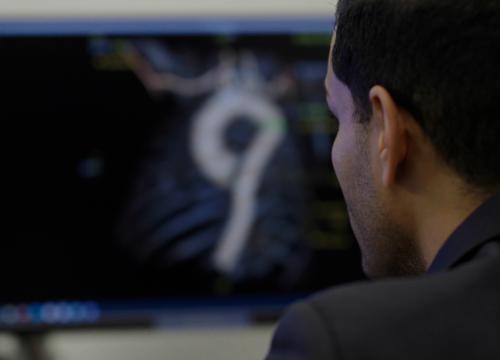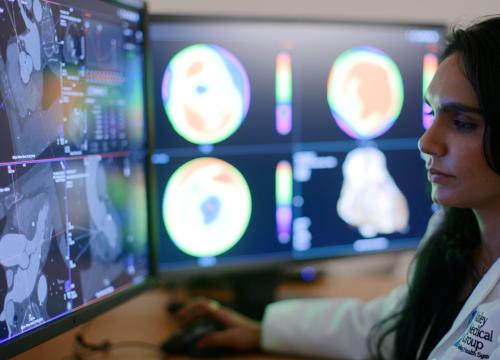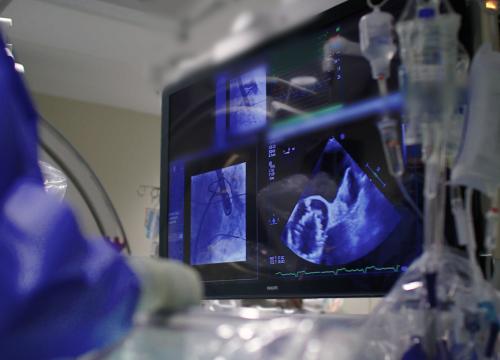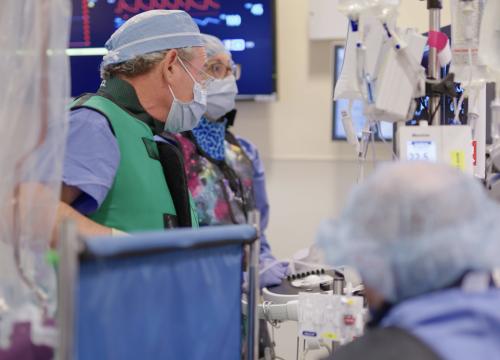Ventricular arrhythmias are abnormal heart rhythms that begin in the ventricles, the lower chambers of the heart. These arrhythmias occur when the electrical signals in the ventricles become disorganized, leading to rapid or irregular heartbeats. They can range from benign conditions like premature ventricular contractions (PVCs), which may not cause symptoms, to life-threatening conditions like ventricular tachycardia (VT) or ventricular fibrillation (VF).
A diagnosis of ventricular arrhythmias can be overwhelming, but when managed properly, patients will experience an improved quality of life and life expectancy. That’s why Valley developed a Ventricular Arrhythmia Program, designed to offer comprehensive care for patients diagnosed with PVC or VT.
WATCH: Mohammadali Habibi, MD, Director of Valley's Ventricular Arrhythmia Program, discusses highlights of Valley's program — including leading-edge treatments, access to a multispecialty team, and personalized options for patients.
Types of Ventricular Arrhythmias
Premature Ventricular Contraction
Premature ventricular contraction occurs when the heart's ventricles, the lower chambers of the heart that are responsible for pumping blood, contract earlier than they should, interrupting the regular heart rhythm.
Ventricular Tachycardia
Ventricular tachycardia occurs when scar tissue creates abnormal electrical pathways in the ventricles, causing the heart to beat rapidly. This can lead to ineffective pumping of blood and reduced blood flow to vital organs.
The Valley Approach to Ventricular Arrhythmias
Diagnosis
Ventricular arrhythmias are diagnosed through a combination of clinical assessment, electrocardiographic (electrocardiogram) findings, and additional tests as needed. The key diagnostic tool is an electrocardiogram (ECG), where ventricular arrhythmias are identified by rapid heart rates originating from the ventricles. If the arrhythmia is intermittent or not captured on a standard ECG, a Holter monitor, or an event recorder may be used to detect episodes.
In some cases, additional tests including an echocardiogram or advanced imaging, such as cardiac MRI, may be used to assess the heart's structure and rule out underlying causes of disease like scarring or cardiomyopathies.
Ventricular arrhythmia can sometimes be linked to genetic conditions, making a thorough family history an important part of the diagnostic process. In cases where a genetic cause is suspected, genetic testing may be necessary to identify specific genes that could be responsible for the condition. This helps in both diagnosis and guiding treatment, as well as assessing risk for other family members.
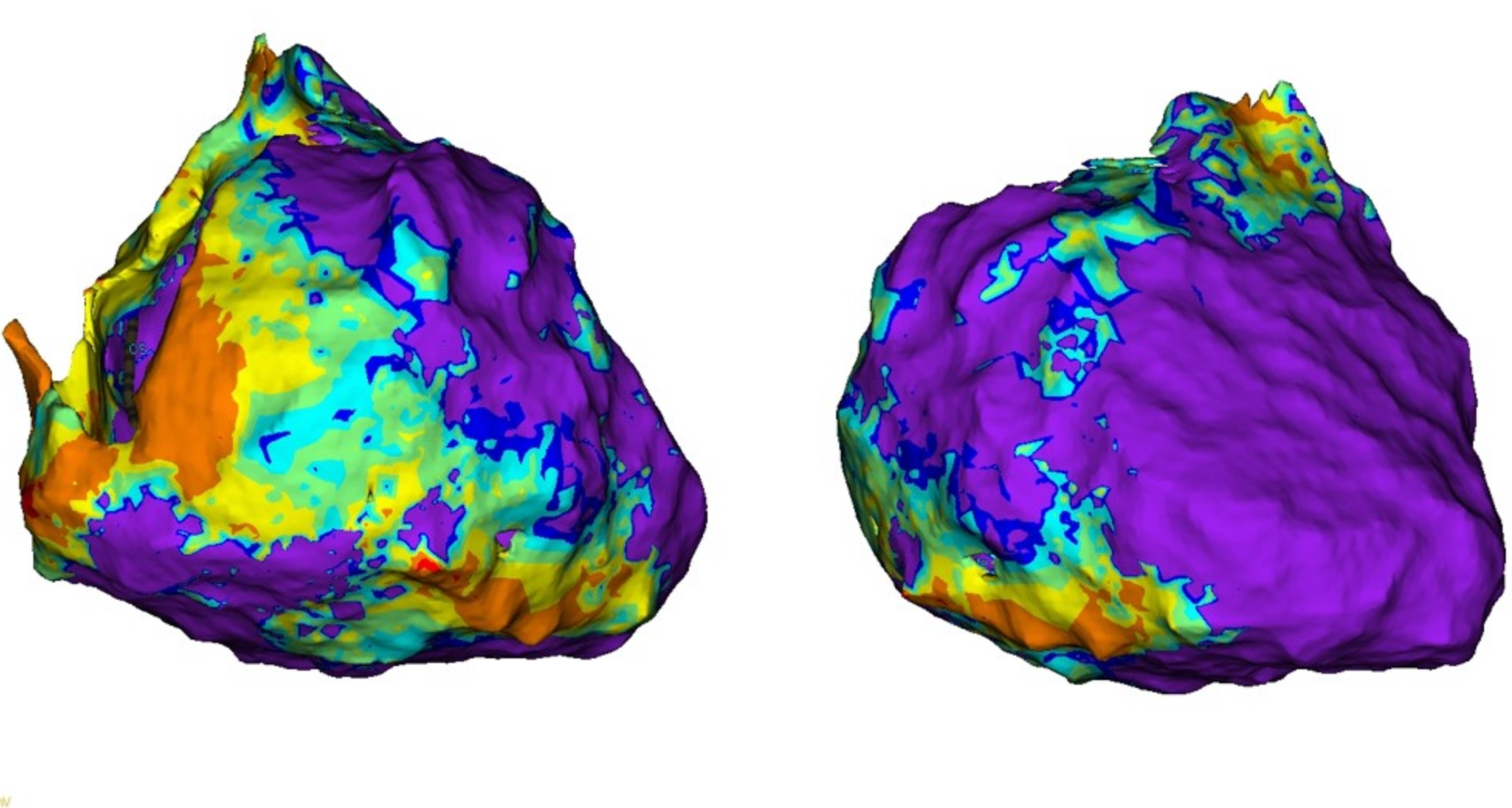
Treatment Options
Each patient in the Ventricular Arrhythmia Program receives a personalized treatment plan designed to meet their specific needs. Treatment for VT varies based on the underlying cause and the severity of the condition. At Valley Hospital’s Ventricular Arrhythmia Program, we offer a full range of treatment options for ventricular tachycardia, ensuring that we can provide the most appropriate care for each patient. Treatment options may include:
Anti-arrhythmic therapy: Anti-arrhythmic therapy for managing VT involves medications that help control the heart's rhythm and prevent fast, abnormal heartbeats. These medications work by stabilizing the electrical signals in the heart to reduce the chances of VT episodes. While anti-arrhythmic drugs can help manage symptoms and improve quality of life, they are usually tailored to each person’s condition. Regular follow-ups are important, as adjustments may be needed based on how well the medication works and any potential side effects. In some cases, these medications are combined with other treatments, including ablation or an implantable device.
Implantable cardioverter defibrillator: In cases where the heart has become damaged or scar tissue has formed due to previous heart attacks or other cardiac conditions, VT can be life-threatening. This level of disease often necessitates treatment with an implantable cardioverter-defibrillator (ICD). The ICD is placed under the skin and monitors your heart rhythm, delivering a shock if a dangerous rhythm is detected and helping to restore a normal heartbeat and save the patient’s life. An ICD cannot prevent episodes of VT from occurring.
Catheter ablation: A minimally invasive catheter ablation procedure aims to destroy the abnormal heart tissue (scar tissue) responsible for VT, making it the most effective method for reducing or eliminating VT episodes.
Catheter ablation for VT requires the expertise of a skilled cardiac electrophysiologist, who specializes in treating heart rhythm disorders. Before an ablation is recommended, a comprehensive evaluation is conducted with experts in cardiac anesthesiology, advanced heart failure, and heart rhythm specialists. Patients often undergo advanced imaging of the heart, using magnetic resonance imaging (MRI) or computed tomography (CT) scans, to better understand the heart's anatomy and identify the location of the scar tissue.
Epicardial ventricular tachycardia ablation: The heart is a three-dimensional organ with inner and outer surfaces called the endocardium and epicardium, respectively. Catheter ablation is used when scar tissue is located in the endocardium. When scar tissue is located on the outer surface of the heart (epicardium), an epicardial ablation is performed. This technique is often considered when VT is resistant to standard treatments or when imaging shows that the abnormal electrical circuits are on the heart's outer surface. By targeting these specific areas, epicardial ablation effectively disrupts or eliminates the abnormal pathways causing VT.
Alcohol ablation: Alcohol ablation is a specialized procedure used when VT is caused by scarring in the heart, often due to previous heart attacks. During the procedure, a small amount of alcohol is injected into a small artery or vein that supplies the scarred area of the heart. The alcohol destroys the abnormal tissue causing the irregular electrical signals, which helps reduce or eliminate VT episodes. This treatment is typically considered when other options, like catheter ablation, are not effective or feasible.
Cardiac sympathectomy: Cardiac sympathectomy is a surgical procedure used to treat VT, especially in cases where other treatments like medication or ablation have not been successful. It involves cutting or disrupting specific nerves of the sympathetic nervous system that trigger abnormal heart rhythms. By reducing the influence of these nerves, the heart becomes less prone to episodes of VT. This treatment is typically reserved for patients with severe or life-threatening arrhythmias, such as those with certain genetic conditions, or patients with significant scarring in the heart. While effective for reducing VT episodes, it is considered a more invasive option.
Non-invasive stereotactic body radiation: Some patients diagnosed with VT – those with additional medical conditions – may continue to experience arrhythmia episodes even while on medication. Due to their medical history, catheter ablation may not be recommended as an alternative treatment approach. Although not yet approved by the U.S. Food and Drug Administration (FDA), radiation therapy targeting the heart has effectively reduced arrhythmia burden in several studies. This treatment is only available at a limited number of centers; The Valley Hospital is one of the few that can offer it as a compassionate use option for this subset of patients.
Why Choose Valley for Ventricular Arrhythmia Care?
- Focusing on your health: Our team focuses on your individual health needs to effectively treat your ventricular arrhythmia. We tailor our approach to your specific condition, using advanced diagnostics and personalized treatment plans to achieve high-quality outcomes for your heart health. Your unique situation guides our care, and we are committed to providing you with the most effective and compassionate treatment.
- Access to all available treatment options: At our state-of-the-art hospital, you'll receive comprehensive care for treating your ventricular arrhythmia. This includes a multidisciplinary team of experts; advanced cardiac imaging and cardiac imaging processing; and genetic counseling if needed. Our facility is equipped to handle complex cases, ensuring you receive care tailored to your needs.





